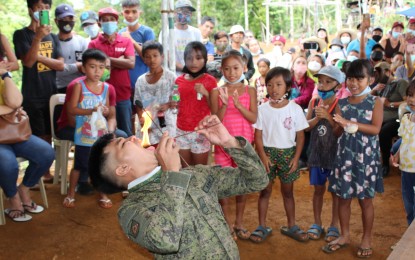
REACHING OUT TO REMOTE VILLAGES. A soldier entertains children during a service caravan in Balangkayan, Eastern Samar in this July 8, 2021 photo. The delivery of services along with combat operations is effective in clearing communities from the threats of the New People's Army in the Eastern Visayas region. (Photo courtesy of Philippine Army)
TACLOBAN CITY – Local government officials in Samar provinces have expressed opposition to the plan of Vice President Leni Robredo to abolish the National Task Force to End Local Communist Armed Conflict (NTF-ELCAC) should she win as president, saying this would worsen the plight of poor residents in the island affected by decades-old armed struggle.
San Roque, Northern Samar Mayor Don Abalon said Robredo should listen to officials from the government’s security agencies and not just rely on information fed by his political allies about the anti-insurgency drive.
Abalon said the NTF-ELCAC has been effectively mobilizing government agencies and other stakeholders to address the root cause of the insurgency.
“Our town is a recipient of PHP160 million worth of barangay development projects (BDP) in 2023. If the national government will discontinue the NTF-ELCAC or slash its budget, about 12,000 poor residents in eight villages will suffer,” Abalon told the Philippine News Agency in a phone interview Thursday.
The BDP is a flagship program of the NTF-ELCAC, which was conceptualized to address insurgency by bringing sustainable solutions and basic services to communities in need.
In an online forum early this week, Robredo said she would abolish the task force and pursue peace talks with the insurgents.
Robredo said she would veer away from purely “militarist approaches to ending internal armed conflict.”
Abalon said Robredo’s belief about NTF-ELCAC as a “purely militarist approach” signifies that she was not well-informed about how the task force works.
“She should know the real situation on the ground for her to come up with the right decision. Security officials are also responsible for informing the Vice President about NTF-ELCAC since she is the second-highest official in our country,” Abalon added.
Office of the Presidential Adviser on the Peace Process (OPAPP) Eastern Visayas program manager Imelda Bonifacio hoped that Robredo would have time to listen to an orientation on Executive Order No. 70.
The formation of task force ELCAC in the national and local levels operationalizes Executive Order No. 70 issued by President Rodrigo Duterte on Dec. 4, 2018.
The directive also institutionalizes a “whole-of-nation approach” in attaining an inclusive and sustainable peace.
“Why not listen to the sentiments of our deprived communities? This is their chance to actively engage in governance. The Vice President should be happy to know that villagers are now empowered,” said Bonifacio, who was born and raised in Matuguinao, Samar, a town infested by New People’s Army (NPA) for decades.
She recalled that each house in her hometown has fox holes as a hiding place for families frightened by frequent raids by the communist terrorist group.
“My personal experience in 1987 was when a group of 50 armed rebels flagged down our motorboat heading to Gandara town. They pointed their guns at us on suspicion that we were spies of the military. That was unforgettable,” Bonifacio recalled.
After three decades, Bonifacio said the government under the Duterte administration has been addressing armed conflict through a whole of nation approach and not just through combat operations.
“Robredo’s remarks that NTF-ELCAC is a militaristic approach is wrong. This strategy is community-driven to identify and prioritize projects that need to be delivered. The communities plan for themselves,” she added.
The government also deployed retooled community support program teams to identify issues and concerns in remote communities threatened by the communist terrorist group and these were addressed by national government agencies and the local government.
The Communist Party of the Philippines-NPA, which has been waging a five-decade armed struggle against the government is listed as a terrorist organization by the United States, European Union, the United Kingdom, Australia, Canada, New Zealand, and the Philippines. (PNA)
